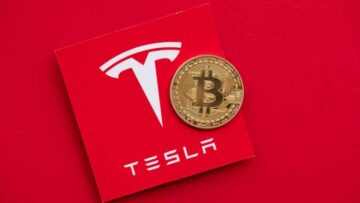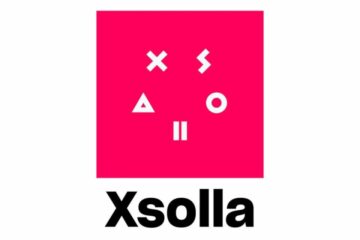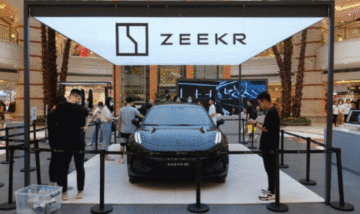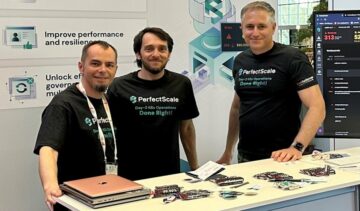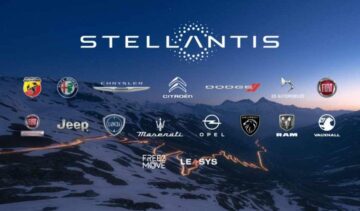Elon Musk made headlines last week after filing a lawsuit against OpenAI and Sam Altman for “breach of contract” and veering away from their original mission. In a dramatic twist to the legal saga, OpenAI has fired back, revealing a trove of emails between Musk and its board members.
The emails shed light on discussions about potentially transforming the organization into a “for-profit” entity as the legal battle between Musk and OpenAI unfolds and tensions continue to escalate.
On March 5th, a blog post co-authored by its prominent leaders, including Sam Altman, Ilya Sutskever, Greg Brockman, John Schulman, and Wojciech Zaremba, was released to shine a light on the company’s stance and its interactions with Musk amidst the ongoing legal dispute.
The genesis of this dispute traces back to February 29th when Musk filed a lawsuit against OpenAI, accusing it of deviating from its initial commitment to make AI advancements freely accessible to the public. Musk, in collaboration with Microsoft, had envisioned a partnership to achieve this goal, alleging OpenAI’s failure to uphold its end of the bargain.
However, OpenAI leaders said in their blog post that they “intend to move to dismiss all of Elon’s claims” and claimed that Musk was leading early initiatives to secure extra funds from investors.
In response, OpenAI’s leaders assert their commitment to dismiss Musk’s claims, citing his own involvement in early discussions to secure additional funding from investors. They reveal insights from email exchanges wherein Musk advocated for a substantial increase in fundraising efforts, pushing for a billion-dollar commitment as opposed to the initially proposed $100 million.
“When starting OpenAI in late 2015, Greg and Sam had initially planned to raise $100mn,” they wrote, but “Elon said in an email: ‘We need to go with a much bigger number than $100mn to avoid sounding hopeless… I think we should say that we are starting with a $1bn funding commitment.’”
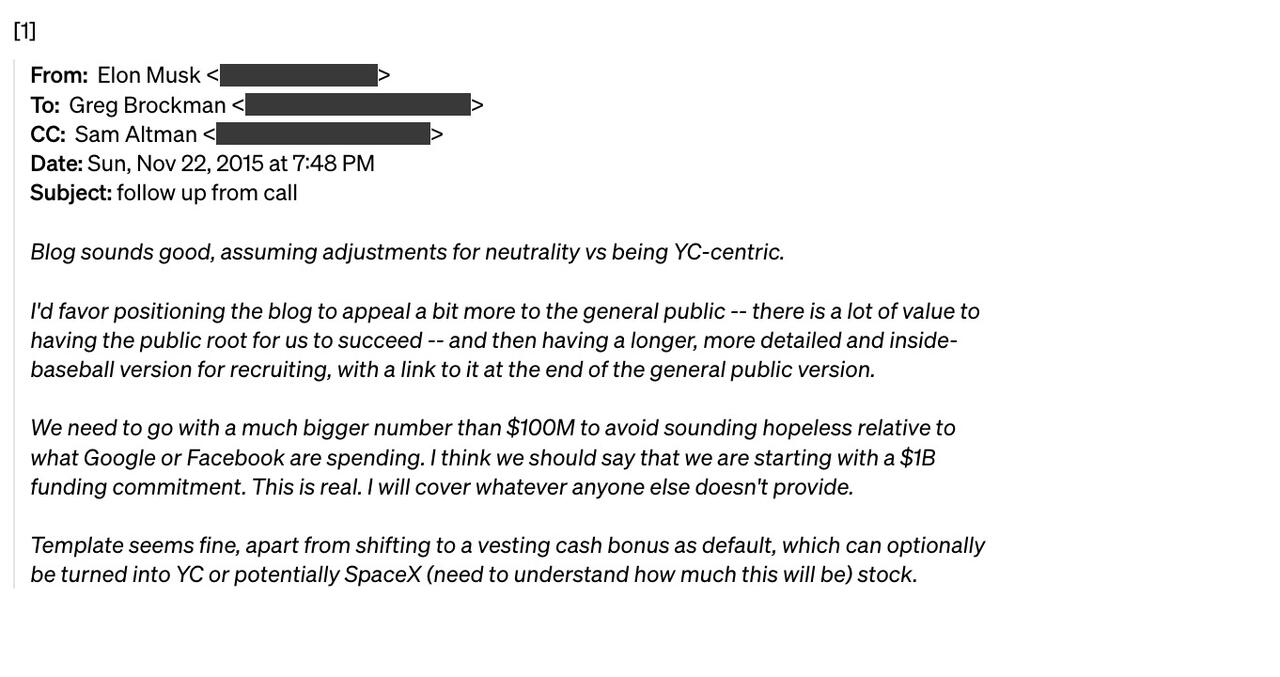
Musk’s emails released by OpenAI. Source: OpenAI
At the crux of the conflict lies Musk’s purported desire for a for-profit entity, which clashed with OpenAI’s founding principles as a nonprofit organization. The company highlights Musk’s insistence on controlling the majority equity, board positions, and the CEO role within the envisioned for-profit structure, a proposition deemed incompatible with OpenAI’s mission.
Moreover, OpenAI underscores Musk’s withholding of further funding amidst negotiations, culminating in an impasse over the company’s direction. Musk, in an alternative proposition, suggested merging OpenAI into Tesla, a move deemed equally incompatible with the organization’s ethos.
In a bid to reaffirm its commitment to its mission, OpenAI clarifies its stance on the dissemination of AI advancements. While recognizing the need for discretion as AI technologies evolve, the company reiterates its dedication to ensuring the widespread availability of beneficial AI tools to the public.
As legal proceedings unfold, industry observers speculate on the potential ramifications for OpenAI. Some express concerns over the company’s future, drawing parallels to cautionary tales such as WeWork’s meteoric rise and subsequent downfall. Amidst uncertainty, OpenAI remains steadfast in its pursuit of advancing AI for the greater good, as underscored by its recent actions in the face of adversity.
OpenAI stated that it is “advancing its mission” by building its “beneficial tools” that are widely available to the public. The organization claimed that Musk was aware that their mission did not “imply open-sourcing AGI.”
The creator of ChatGPT also provided an email exchange between Sutskever and Musk, where Sutskever mentioned, “As we get closer to building AI, it will make sense to start being less open. The Open in OpenAI means that everyone should benefit from the fruits of AI after it’s built, but it’s totally OK to not share the science…,” to which Elon responded with a simple “Yup.”

Below are excerpts from the OpenAI blog post.
We realized building AGI will require far more resources than we’d initially imagined
Elon said we should announce an initial $1B funding commitment to OpenAI. In total, the non-profit has raised less than $45M from Elon and more than $90M from other donors.
When starting OpenAI in late 2015, Greg and Sam had initially planned to raise $100M. Elon said in an email: “We need to go with a much bigger number than $100M to avoid sounding hopeless… I think we should say that we are starting with a $1B funding commitment… I will cover whatever anyone else doesn’t provide.” [1]
We spent a lot of time trying to envision a plausible path to AGI. In early 2017, we came to the realization that building AGI will require vast quantities of compute. We began calculating how much compute an AGI might plausibly require. We all understood we were going to need a lot more capital to succeed at our mission—billions of dollars per year, which was far more than any of us, especially Elon, thought we’d be able to raise as the non-profit.
We and Elon recognized a for-profit entity would be necessary to acquire those resources
As we discussed a for-profit structure in order to further the mission, Elon wanted us to merge with Tesla or he wanted full control. Elon left OpenAI, saying there needed to be a relevant competitor to Google/DeepMind and that he was going to do it himself. He said he’d be supportive of us finding our own path.
In late 2017, we and Elon decided the next step for the mission was to create a for-profit entity. Elon wanted majority equity, initial board control, and to be CEO. In the middle of these discussions, he withheld funding. Reid Hoffman bridged the gap to cover salaries and operations.
We couldn’t agree to terms on a for-profit with Elon because we felt it was against the mission for any individual to have absolute control over OpenAI. He then suggested instead merging OpenAI into Tesla. In early February 2018, Elon forwarded us an email suggesting that OpenAI should “attach to Tesla as its cash cow”, commenting that it was “exactly right… Tesla is the only path that could even hope to hold a candle to Google. Even then, the probability of being a counterweight to Google is small. It just isn’t zero”. [2]
Elon soon chose to leave OpenAI, saying that our probability of success was 0, and that he planned to build an AGI competitor within Tesla. When he left in late February 2018, he told our team he was supportive of us finding our own path to raising billions of dollars. In December 2018, Elon sent us an email saying “Even raising several hundred million won’t be enough. This needs billions per year immediately or forget it.” [3]
- SEO Powered Content & PR Distribution. Get Amplified Today.
- PlatoData.Network Vertical Generative Ai. Empower Yourself. Access Here.
- PlatoAiStream. Web3 Intelligence. Knowledge Amplified. Access Here.
- PlatoESG. Carbon, CleanTech, Energy, Environment, Solar, Waste Management. Access Here.
- PlatoHealth. Biotech and Clinical Trials Intelligence. Access Here.
- Source: https://techstartups.com/2024/03/06/openai-releases-email-from-elon-musk-about-turning-the-company-into-a-for-profit-entity-as-legal-battle-continues/
- :has
- :is
- :not
- :where
- $100 million
- $1bn
- 1
- 11
- 2%
- 2015
- 2017
- 2018
- 23
- 32
- 36
- 39
- 45
- 5th
- 6
- 7
- a
- Able
- About
- Absolute
- accessible
- Achieve
- acquire
- actions
- Additional
- advancements
- advancing
- After
- against
- AGI
- agree
- AI
- All
- also
- alternative
- altman
- Amid
- amidst
- an
- and
- Announce
- any
- anyone
- ARE
- AS
- At
- availability
- available
- avoid
- aware
- away
- back
- Battle
- BE
- because
- began
- being
- beneficial
- benefit
- between
- bid
- bigger
- billions
- Blog
- board
- bridged
- build
- Building
- built
- but
- by
- calculating
- came
- capital
- Cash
- cautionary
- ceo
- ChatGPT
- chose
- citing
- claimed
- claims
- closer
- collaboration
- Commenting
- commitment
- company
- Company’s
- competitor
- Compute
- Concerns
- conflict
- Container
- continue
- control
- controlling
- could
- cover
- create
- creator
- crux
- culminating
- December
- decided
- dedication
- deemed
- desire
- DID
- direction
- discretion
- discussed
- discussions
- Dismiss
- Dispute
- do
- Doesn’t
- dollars
- donors
- downfall
- dramatic
- drawing
- Early
- efforts
- Elon
- Elon Musk
- else
- emails
- end
- enough
- ensuring
- entity
- envision
- envisioned
- equally
- equity
- escalate
- especially
- Ethos
- Even
- everyone
- evolve
- exchange
- Exchanges
- express
- extra
- Face
- Failure
- far
- February
- felt
- filed
- finding
- fired
- For
- founding
- freely
- from
- Fruits
- full
- funding
- Fundraising
- funds
- further
- future
- gap
- Genesis
- get
- Go
- goal
- going
- good
- greater
- greg
- had
- Have
- he
- Headlines
- highlights
- himself
- his
- hold
- hope
- How
- HTTPS
- hundred
- i
- immediately
- in
- Including
- incompatible
- Increase
- individual
- industry
- initial
- initially
- initiatives
- insights
- instead
- interactions
- into
- Investors
- involvement
- IT
- ITS
- John
- jpg
- just
- Last
- Late
- lawsuit
- leaders
- leading
- Leave
- left
- Legal
- legal proceedings
- less
- LG
- lies
- light
- Lot
- made
- Majority
- make
- March
- means
- Members
- mentioned
- Merge
- merging
- meteoric
- Microsoft
- Middle
- might
- million
- Mission
- more
- move
- much
- Musk
- necessary
- Need
- needed
- needs
- negotiations
- next
- non-profit
- Nonprofit
- number
- observers
- of
- on
- ongoing
- only
- open
- OpenAI
- Operations
- opposed
- or
- order
- organization
- original
- Other
- our
- over
- own
- Parallels
- Partnership
- path
- per
- planned
- plato
- Plato Data Intelligence
- PlatoData
- plausible
- positions
- Post
- potential
- potentially
- principles
- probability
- Proceedings
- prominent
- proposed
- proposition
- provide
- provided
- public
- pursuit
- Pushing
- quantities
- raise
- raised
- raising
- ramifications
- reaffirm
- realization
- realized
- recent
- recognized
- recognizing
- relative
- released
- Releases
- relevant
- remains
- require
- Resources
- response
- reveal
- revealing
- Rise
- Role
- saga
- Said
- salaries
- Sam
- say
- saying
- secure
- sense
- sent
- several
- Share
- shed
- shine
- should
- Simple
- small
- some
- Soon
- Source
- spent
- stance
- start
- Starting
- Startups
- stated
- steadfast
- Step
- structure
- subsequent
- substantial
- succeed
- success
- such
- supportive
- tales
- team
- tech
- tech startups
- Technologies
- tensions
- terms
- Tesla
- than
- that
- The
- their
- then
- There.
- These
- they
- Think
- this
- those
- thought
- time
- to
- told
- tools
- Total
- TOTALLY
- transforming
- trying
- Turning
- twist
- Uncertainty
- underscored
- underscores
- understood
- Uphold
- us
- Vast
- wanted
- was
- we
- week
- were
- whatever
- when
- which
- while
- widely
- widespread
- will
- with
- within
- would
- wrote
- year
- zephyrnet


